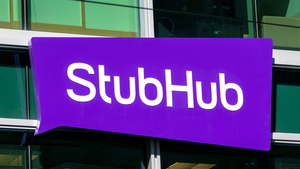Secondary ticketing company StubHub has pushed back a planned Initial Public Offering to the autumn, according to sources. The delay comes as artist and fan-led campaigning against ticket resale gains momentum even in the US
StubHub, which operates the StubHub platform in the US and Viagogo everywhere else, has been working with JPMorgan and Goldman Sachs on a planned IPO for two years. The company previously filed paperwork confidentially with the US Securities & Exchange Commission and there was speculation that would be made public at the end of last week.
However, sources told Bloomberg that the IPO has now been pushed back until after Labor Day, 2 Sep, because of “stagnant market conditions”.
The current StubHub business was created by the merger of StubHub US and Viagogo in 2020. As part of that merger, StubHub’s international division, which runs the StubHub ticket resale websites outside North America, was spun off as a separate company.
StubHub bosses are aiming for a valuation at listing of at least $16.5 billion, which seems ambitious, though the company is clearly aiming to capitalise on the boom in live music at the upper end of the market. It will also be hoping that the investment community isn’t too concerned about the ongoing campaigns to ramp up the regulation of ticket touting.
In the UK, after years of campaigning by music industry and consumer rights groups, the new Labour government has committed to introduce a 10% price cap on ticket resale. The commitment even made it into the Labour Party’s election manifesto, albeit in slightly less specific terms (pledging “new consumer protections on ticket resales”).
That said, for StubHub, what really matters is the US market, where ticket resale is more readily accepted as a routine part of the live entertainment business, and where there is less regulation.
However, anti-touting campaigners within the music community are becoming more vocal in the US too, especially those involved in the Fix The Tix campaign. They encouraged both artists and fans to write to lawmakers in Washington last week asking them to introduce more ticket resale regulation. And campaigners say that 65,000 letters and messages were sent.
Stephen Parker, Executive Director of the National Independent Venue Association, which led on that campaign, says the high level of letter sending demonstrates that the “consumers, fans and artists that make up this country’s live events industry will not stand by and let predatory resellers control our ticketing-buying experience”.
“This week’s actions send a clear message to Congress that the time for comprehensive reform is now”, he adds. “This country needs legislation that bans fake tickets, ends price gouging, and illegalises deceptive marketing tactics”
US campaigners are not yet calling for anything as severe as price cap. And StubHub will likely tell the investment community that new rules around transparency and marketing practices won’t be too damaging for its business, even though both StubHub and Viagogo have fought hard to avoid rules of that kind in other countries in the past.
However, if Labour does put the price cap in place in the UK in the coming months, and that gets coverage in the global financial press, it might cause some concern for more cautious investors that - if the US was to ultimately follow the UK’s lead - that could create problems for StubHub’s long-term prospects.

